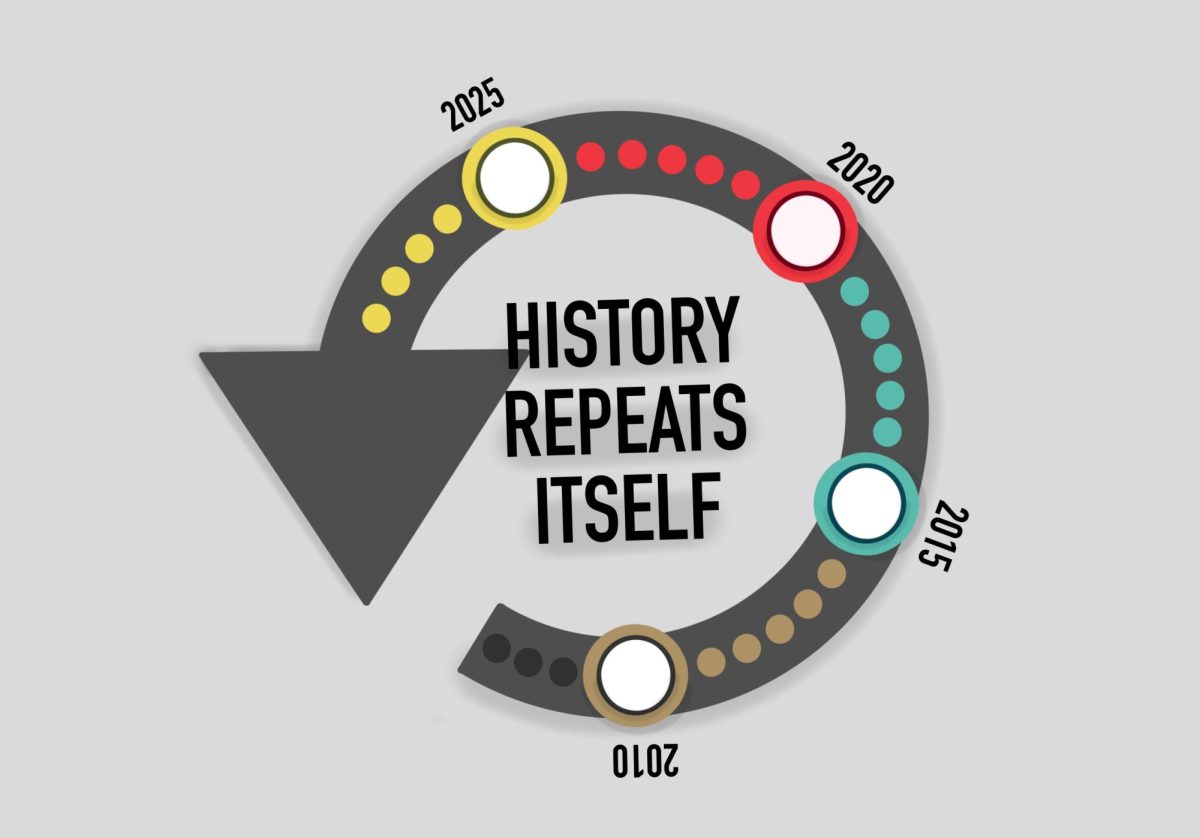This week as I drove between work and home, I decided to turn on the first Bob Dylan album I ever listened to, a compilation of some of his unreleased songs and versions of songs titled “The Bootleg Series, Volumes 1-3.” The album is riddled with old straight-folk gems from his Greenwich Village days, when his lyrics were almost always politically charged. Shuffling through the album, I came across a song called “Talkin’ John Birch Paranoid Blues” that had me laughing out loud to myself. Over solo guitar, Dylan speaks from the perspective of a man who joins the John Birch Society and begins his “American duty,” searching his neighborhood high and low for communists. Failing to find any among the sidewalk bushes or in his car door or toilet, he begins to imagine them sitting in a TV set that shocks him, blaming communists for the pain of the zap. At that point, his paranoia has distorted his reality so much that he calls former presidents “Russian spies,” and thinks Betsy Ross put red stripes on the flag because she herself must have been a “red.” In the end, out of a job and with nothing else to do, the unnamed narrator sits at home and investigates himself. The last line hangs on an exhausted “good God.”
The song is funny. The audience in the recording, presumably all leftist New York beatniks, cracks up at most of the song’s lines as Dylan thumbs his nose at McCarthyism. So why was I left feeling sorry for the unnamed narrator, a man who ate up hateful and paranoid propaganda, only to hurt himself in the end? Well, while I laughed at the jokes in the song, I could not find it in myself to completely blame the “Bircher.” While most of our discussion about McCarthyism relates to how it attacked freedom of speech and expression, the song taught me a slightly different lesson. Dylan opted to use the perspective of the narrator to show how those who support an ideology that demonizes dissent also become victims in their own right, manipulated, isolated, and unable to think freely.
While the man in the song never existed, he is representative of possible effects of McCarthyist tactics, which certainly did exist. I am not a historian, so I am going to stay away from the specifics of the Red Scare of the 1950s and focus more broadly on the strategy of inciting paranoia — fear mongering. My understanding of its aim goes like this: if you can make a population afraid of an ideology or party, you can discredit anything that party says or does on account of their vilification. If the other party is successfully discredited in the public eye, your party gets more power and gains more control over the political narrative. Once this control is established, you are free to completely sway those who have ascribed to your ideology because you offer the only set of “credible” facts. This is what was, in effect, done to the man in the story, and thus he had to create a reality that fit with the set of facts that his ideology offered. As a hyper-conservative in the 1950s, this meant that if he did not see communists anywhere, they must be hiding. The only possible reality to him was that there were, beyond any shadow of a doubt, communist insurgents in America, so he made them up.
Fear-mongering is a profoundly deep form of manipulation. It is not time, place, or party specific — yes, both parties can and do participate in one way or another. So although plenty of blame lies with the man himself (or any person who allows themselves to be manipulated this way), I think it is arrogant to approach the topic without acknowledging its power. From what I see today, it seems like most people can be manipulated into fearing or hating another group of people if they 1) have a pre-disposed distaste for or concern about the group that can be taken advantage of (emphasis on “can be taken advantage of”) and 2) are presented with strong evidence of the group’s danger to society, whether it is actually present or not. Once these two requirements are met, one shuts out any opinion or idea of said group, and whichever ideology that controls the person’s set of facts pushes them to hate the opposing group more and more.
In “Talkin’ John Birch Paranoid Blues,” Dylan describes an episode that seems even more relevant today than in his own time. While anti-communist groups like the John Birch Society (JBS) and the American Public Relations Forum carried some cultural weight along with the famous Hollywood Blacklists, much of what we call McCarthyism was reserved to organizational government action. For how significant it was, it was more centralized than what I see as the manipulation we face today. We still have groups like the JBS and politicians that gain their popularity from scaring people about the other party, but there is an added element, one that is harder to point directly at.
What we face now that Dylan’s Bircher did not is the internet: social media echo chambers, youtube channels that have flashy titles to gain clicks and blog post rabbit holes all amplify the issue, creating more and more paranoid false realities. We now use our own voices to spiral each other further into these “false realities,” to the point where someone on the other side of the aisle would need a translator to understand our message.The result is that, though I would not go so far as to say we are McCarthyist, party lines have started to look like untraversable valleys.
So, when I hear the song, when I look at the events of Jan. 6 or COVID-19 spikes in states with vaccine hesitancy, or just our political division in general, what comes to my mind? I cannot help but feel that we are in one way or another being taken advantage of. By allowing ourselves to be manipulated into fearing and hating the other party, we are allowing ourselves to be robbed of something, something essential to any democracy: the ability to have difficult, but civil, conversations.
No, no one is taking away our freedom of speech, per se. But, while specific interpretations of the First Amendment have been historically muddy, one has to assume that at some level, the writers of it hoped it would preserve our ability to have open discussions, political and otherwise. The promotion of discussion is baked into the First Amendment.
I believe that almost as essential as our freedom of speech is our freedom to listen; inseparable from our freedom to express our ideas is our privilege to engage with the ideas of others. The protection of our voices is fruitless if we do not also protect our ability and right to listen to others, as there is simply no need to infringe upon our ability to speak if we can be manipulated into not listening to each other. While officials battle over what to do about misinformation (or misleading information) online and in speeches, we must start the battle at home and online. We cannot let our distaste for other opinions be taken advantage of. We must constantly encourage dissenting opinions that are relevant and credible, and we must take a hard look at those who share our own beliefs and how much of their message focuses on demonizing the other side.
It can be difficult to withhold character judgments about someone based on their political beliefs, but that is the burden of having productive dialogue. When we watch the news, vote for politicians and amplify certain voices on social media, we need to ask ourselves if the figures we are interacting with are playing into the vilification of whole groups of people on the other side. Continuing this way simply is not viable. Until we stop encouraging the message (with our time, money, votes) that every stance on a complicated issue is simply the product of how evil one side or the other is, we will all remain that paranoid, unnamed narrator in Bob Dylan’s song, searching for boogeymen that do not exist.














